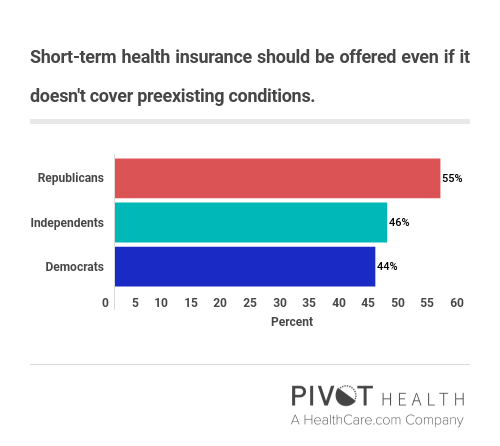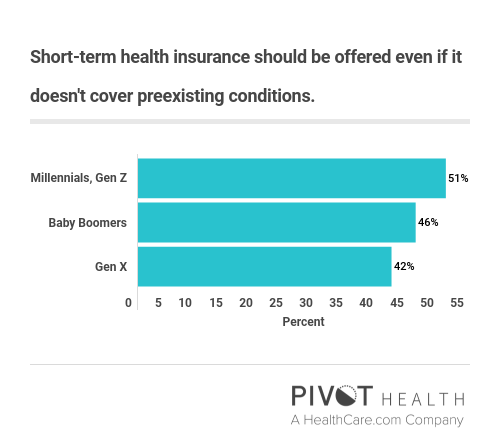With the Affordable Care Act under attack in the Supreme Court and COVID-19 stalking the nation, a new survey shows Americans split on how to cover the nation’s healthcare needs.
The survey examined Americans’ views on short-term health insurance, which people turn to as an alternative to pricier but more comprehensive ACA plans.
Nationwide, 47% of respondents said short-term health insurance should be offered even if it doesn’t cover preexisting conditions or offer select benefits.
20% said it shouldn’t be offered and 33% said they didn’t know.
By party, 55% of Republicans said short-term health insurance plans should be offered compared to 44% of Democrats and 46% of independents.
Pivot Health, a HealthCare.com company, conducted the survey from November 24th to 30th to gauge support for short-term health insurance as the Supreme Court hears a new case to strike down the Affordable Care Act (ACA or “Obamacare”).

Only 14% of Republicans, compared to 27% of Democrats and 22% of independents answered short-term health plans should not be sold without covering preexisting conditions and offering select benefits.
However, a larger percentage was unsure of their position. 31% of Republicans, 29% of Democrats and 32% of independents answered they either didn’t know or weren’t sure.
Majority of Millennials, Gen Z Support Short-Term Health Insurance
By generation, Millennials and Generation Z (all born after 1980) respondents most strongly favored short-term health insurance.
51% of respondents born after 1980 said short-term health insurance plans should still be offered, even if they don’t cover preexisting conditions or offer select benefits like maternity care.
Just 42% of Gen X (born 1965-1980) and 46% of Baby Boomers (born 1946-1964) agreed.

Respondents also expressed guarded support for short-term plans regardless of income.
48% who made less than $50,000 said short-term health insurance plans should still be offered, compared to only 20% who disagreed.
A similar 47% of respondents with family incomes $50,000 and over said short-term plans should be offered, compared to 23 who said they should not.
By race, non-Whites including those identifying as two or more races were more in favor of short-term health insurance.
53% percent of non-Whites said short-term health insurance plans should still be offered.
Only 43% of Whites agreed.
Support for Extended Short-Term Health Insurance
Asked if the current 36-month limit to short-term plans is a sufficient amount of time to have short-term health insurance, 43% of respondents either somewhat or strongly agreed.
Only 14% somewhat or strongly disagreed, evidence of low support for extended short-term health insurance duration limits.
Meanwhile, a substantial 43% neither agreed nor disagreed.
By party identification, 51% of Republicans strongly or somewhat agreed that 36 months is a sufficient duration for short-term health insurance.
42% each of Democrats and independents strongly or somewhat agreed.
Meanwhile, 10% of Republicans somewhat or strongly disagreed that the 36-month limit to short-term plans is sufficient, compared to 17% of Democrats and 14% of independents.
But many respondents were noncommittal. 39% of Republicans, 41% of Democrats and 44% of independents neither agreed nor disagreed.
Coverage Loss, Cost Drive Short-Term Insurance Uptake
A separate November Pivot Health customer survey shows that for many people buying short-term plans, the loss of employer coverage is a key driver in purchasing the plans.
Americans can turn to short-term health insurance as a cheaper or stopgap option to more comprehensive but costly plans on the ACA exchanges.
Amid rising layoffs due to COVID-19, 37% of respondents – up from 29% in April – previously had health insurance through an employer but lost coverage.
In November 29%, up from 23% of pollees in April, chose a short-term plan over an ACA plan because they didn’t qualify for a subsidy.
Short-Term Insurance Myths
Critics of short-term health insurance plans say they don’t accept people with preexisting conditions and can siphon healthy customers from the ACA health exchanges.
But three successive Pivot Health customer surveys including the November poll have shown that only 5% to 6% of respondents had ACA plans before purchasing a Pivot plan.
The Supreme Court will decide the ACA case next year. Meanwhile, a new Biden administration could potentially limit short-term health insurance plans introduced after the Trump administration eased rules.
Methodology
Pivot Health, a HealthCare.com company, commissioned YouGov America to conduct the first survey cited. All figures, unless otherwise stated, are from YouGov America. The total sample size was 1,200 adults. Fieldwork was undertaken November 24-30, 2020. The survey was carried out online. The figures have been weighted and are representative of all U.S. adults (aged 18+). The margin of error is 2.6% plus or minus.
Pivot Health conducted the second survey cited in November 2020 with current customers who have active policies. Four hundred and forty-six customers from 35 states completed the survey. The survey was carried out online. The figures are representative of U.S. adults aged 18-64.

 877-246-0106
877-246-0106

